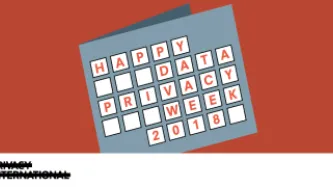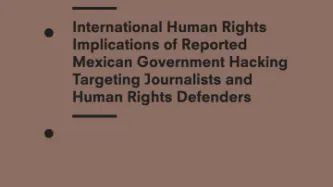Search
Content type: News & Analysis
Private surveillance companies selling some of the most intrusive surveillance systems available today are in the business of purchasing security vulnerabilities of widely-used software, and bundling it together with their own intrusion products to provide their customers unprecedented access to a target’s computer and phone.
It's been known for some time that governments, usually at a pricey sum, purchase such exploits, known as zero- and one-day exploits, from security researchers to…
Content type: News & Analysis
7 October 2013
The following is an English version of an article in the September issue of Cuestión de Derechos, written by Privacy International's Head of International Advocacy, Carly Nyst.
To read the whole article (in Spanish), please go here.
The Chinese government installs software that monitors and censors certain anti-government websites. Journalists and human rights defenders from Bahrain to Morocco have their phones tapped and their emails read by security services. Facebook…
Content type: Long Read
To celebrate Data Privacy Week, we spent the week discussing privacy and issues related to control, data protection, surveillance, and identity. Join the conversation on Twitter using #dataprivacyweek.
Do you live in a “smart city”? Chances are, you probably do (or at least your city claims to be). But do you know what exactly makes your city “smart”, beyond the marketing term? And what does this have to do with privacy?
Companies and governments will tell you that the more cameras, sensors…
Content type: News & Analysis
It has been almost 40 years since the Council of Europe’s Convention 108 for the Protection of Individuals with regard to Automatic Processing of Personal Data was signed. The Convention was the first binding treaty dealing with privacy and data protection that recognised the necessity to “reconcile the fundamental values of the respect for privacy and the free flow of information between peoples” and is the reason why we celebrate Data Protection Day annually on 28 January.
It has since been…
Content type: Key Resources
Introduction
Why We Are So Concerned about Government Hacking for Surveillance
Scope of Our Safeguards
1. Legality
2. Security and Integrity of Systems
3. Necessity and Proportionality
4. Judicial Authorisation
5. Integrity of information
6. Notification
7. Destruction and Return of Data
8. Oversight and Transparency
9. Extraterritoriality
10. Effective Remedy
Commentary on each
1. Legality
2. Security and Integrity of Systems
3. Necessity and Proportionality
4.…
Content type: Long Read
Introduction
Why We Are So Concerned about Government Hacking for Surveillance
Scope of Our Safeguards
1. Legality
2. Security and Integrity of Systems
3. Necessity and Proportionality
4. Judicial Authorisation
5. Integrity of information
6. Notification
7. Destruction and Return of Data
8. Oversight and Transparency
9. Extraterritoriality
10. Effective Remedy
Commentary on each
1. Legality
2. Security and Integrity of Systems
3. Necessity and Proportionality
4.…
Content type: News & Analysis
7 July 2017
War profiteers are finding the data business easy going. The have wielded their unwarranted influence and applied their business model of causing and then profiting from insecurity and applied it to the digital age; the results have been more profit for them and less liberty for you.
When a politician riles against an evil tech giant for providing ‘safe spaces’ online, it’s a political distraction. The real battle for your data is being fought between the emergent tech…
Content type: News & Analysis
Surveillance in digital spaces is the policing and monitoring of activity of those occupying these spaces. Surveillance affects free speech, privacy and behaviour of digital users. Feminism and a feminist approach to surveillance puts marginalised communities, those that are victims of class discrimination, racial and patriarchal structures, at the centre of discourse around privacy and surveillance.
Surveillance in Pakistan is often seen as an issue of national security. With the National…
Content type: News & Analysis
October 31st 2017 will mark the 3rd World Cities Day (we will forgive if you did not know that), with the general theme “Better City, Better Life.” On this date, PI will be launching its latest report “Smart Cities: Utopian Vision, Dystopian Reality”. This is an opportunity for us to ask: who exactly are our cities going to become better for?
Technology is often given as an answer when we are not sure what the question is. Cities are no exception to that. The current…
Content type: Case Study
Cities around the world are deploying collecting increasing amounts of data and the public is not part of deciding if and how such systems are deployed.
Smart cities represent a market expected to reach almost $760 billion dollars by 2020. All over the world, deals are signed between local governments and private companies, often behind closed doors. The public has been left out of this debate while the current reality of smart cities redefines people’s right to privacy and creates new…
Content type: Case Study
Financial services are collecting and exploiting increasing amounts of data about our behaviour, interests, networks, and personalities to make financial judgements about us, like our creditworthiness.
Increasingly, financial services such as insurers, lenders, banks, and financial mobile app startups, are collecting and exploiting a broad breadth of data to make decisions about people. This is particularly affecting the poorest and most excluded in societies.
For example, the decisions…
Content type: Advocacy
On 28 June 2017, Privacy International sent a letter and briefing to the Mexican government following reports indicating that Mexican authorities had used NSO Group’s Pegasus spyware to target journalists and human rights defenders working to expose government corruption and human rights abuses. NSO Group is a surveillance technology company that sells products and services, including malware, exclusively to government clients.
These attacks were designed to compromise the mobile phones of…
Content type: Long Read
Tech firms and governments are keen to use algorithms and AI, everywhere. We urgently need to understand what algorithms, intelligence, and machine learning actually are so that we can disentangle the optimism from the hype. It will also ensure that we come up with meaningful responses and ultimately protections and safeguards.
Many technologists emerge from University, College or graduate courses with the impression that technology is neutral and believe that all systems they apply their…
Content type: News & Analysis
One of the most controversial aspects of the UK's Investigatory Powers Bill proposes the storing by ISPs and mobile network providers of 'Internet Connection Records' (ICRs). While vaguely defined, they will include your internet browsing history (although the Government is at pains to clarify that only the websites you visit, not the specific webpages on those websites will be stored), and what apps you have accessed, over the previous 12 months.
Clearly then ICRs are personal…
Content type: Long Read
“This is my personal opinion,” concedes Branko, a taxi driver in Skopje, the Republic of Macedonia's capital. “It was done by America to stop Putin building his gas pipe line through Macedonia.”
“This is just politics,” he advises, skeptically.
It's a common reaction to the wiretapping scandal in Macedonia. Beginning in February last year when opposition leader Zoran Zaev posted a series of wiretaps online that he called 'bombs' – they seemingly showed that for years the phone calls of some…
Content type: Press release
Privacy International today publishes a new investigation, based on exclusive documents, exposing the sale of European surveillance technologies to a secret unit of Egypt's intelligence infrastructure.
The Technical Research Department (TRD) is an independent unit within the General Intelligence Service (GIS), accountable only to the President. According to sources, the TRD has the biggest budget for surveillance technologies of any Egyptian government body. Such large public expenditure…
Content type: News & Analysis
This Sunday is International Women's Day. You could celebrate the considerable progress in legislating for women's equal rights. You could join a protest against political and legal inequality, discrepancies in women's access to healthcare, education and other social goods. You could thank your mom for delivering you.
Here at Privacy International, we want to commemorate the importance of this day by looking at some of the ways surveillance technologies can be used to control women and how the…
Content type: News & Analysis
Last year, UK-based surveillance company Gamma TSE sold the Indonesian military US$ 6.7 million worth of equipment as part of the military's weapons modernisation effort. As early as 2005, Indonesian officials were soliciting the advice of a close partner of Gamma, Germany-based Elaman, to create technical surveillance unit (TSU), according to a white paper published as part of the WikiLeak SpyFiles and found in the Surveillance Industry Index.
Gamma and Elaman are…
Content type: News & Analysis
The latest Snowden document revelation, which shows how GCHQ and the NSA are conducting broad, real-time monitoring of YouTube, Facebook, and Blogger using a program called "Squeaky Dolphin," is the most recent demonstration of the immense interception capabilities of intelligence services.
Despite the program's cute name, "Squeaky Dolphin" is shocking in its ability to intercept raw data, which includes sensitive personal and location information, and keep tabs on people across the world who…
Content type: News & Analysis
The reforms announced today, while positive in some respects, are completely inadequate to address the heart of the problem. Privacy International welcomes steps to minimise the data collected and retained on non-Americans, and the call to increase transparency around requests made to communications service providers. However, in the face of mass surveillance, unaccountable intelligence sharing, arbitrary expansions of the definition of ’national security’, and debased encryption standards…
Content type: News & Analysis
Just search for the term "surveillance state" and you’ll pull up various uses of the term or news articles citing the phrase.
In some respects, this newfound concern can’t be a surprise; given vast new amounts of information in the public sphere since the Edward Snowden leaks began in June. However, it is critical to nail down the exact meaning of the term, so as the public and governments have the debate over State spying, we can actually know what we're talking about. Most importantly, this…
Content type: News & Analysis
The Zimbabwean government extended its reach into the private lives of its citizens this week by promulgating a new law establishing a central database of information about all mobile telephone users in the country. The Statutory Instrument 142 of 2013 on Postal and Telecommunications (Subscriber Registration) Regulations 2013, gazetted last Friday, raises new challenges to the already embattled rights to privacy and free expression in Zimbabwe, increasing the potential that the…
Content type: News & Analysis
The development agenda is heralding a new cure-all for humanitarian and development challenges – data.
In the latest incarnation of the development world’s dominant paradigm, ICTs for Development, data is being embraced, analysed and monitored by companies, humanitarian organisations, aid donors and governments alike. Yet despite the promises of data evangelists that big and open data can revolutionise innovation, education, health care and infrastructure, the potential risks of…
Content type: News & Analysis
Following reports that the Mexican prosecution authority appears to be not only using FinFisher, but also to be involved in a corruption scandal surrounding the purchase of this intrusive surveillance technology, the Mexican Permanent Commission (composed of members of the Mexican Senate and Congress) has urged Mexico's Federal Institute for Access to Public Information and Data Protection (IFAI) to investigate the use of spyware in Mexico.
The corruption scandal, which entails the…
Content type: News & Analysis
The following excerpt is from a posting in the Guardian's Comment is Free by Carly Nyst, Privacy International's Head of International Advocacy.
"In order to challenge a secret surveillance system, and to demand the government explains why it is spying on British citizens, one must apply to a secret tribunal that does not make public its proceedings or the reasons for its decision. It may seem like an Orwellian fantasy, but this is the stark reality of the British legal system.
It's called…
Content type: Advocacy
Just over a year ago, vitally important reforms to European privacy and data protection laws were proposed. Now these reforms, which will affect the rights of half a billion Europeans, are being watered down in their passage through various European parliamentary committees as MEPs succumb to an unprecedented industry lobbying onslaught. There is now irrefutable evidence of the impact of this lobbying, thanks to a technology-powered research method comparing corporate lobby documents…
Content type: News & Analysis
Just over a year ago, vitally important reforms to European privacy and data protection laws were proposed. Now these reforms, which will affect the rights of half a billion Europeans, are being watered down in their passage through various European parliamentary committees as MEPs succumb to an unprecedented industry lobbying onslaught. There is now irrefutable evidence of the impact of this lobbying, thanks to a technology-powered research method comparing corporate lobby documents…
Content type: Press release
Privacy International, the European Center for Constitutional and Human Rights, the Bahrain Center for Human Rights, Bahrain Watch and Reporters without Borders filed formal complaints with the Organisation for Economic Cooperation and Development (OECD) in the UK and Germany against two surveillance companies on Friday 1st February. The British and German National Contact Points are being asked to investigate Gamma International and Trovicor respectively with regards to both companies’…
Content type: News & Analysis
On the surface, it’s all about protecting Russian kids from internet pedophiles. In reality, the Kremlin’s new “Single Register” of banned websites, which goes into effect today, will wind up blocking all kinds of online political speech. And, thanks to the spread of new internet-monitoring technologies, the Register could well become a tool for spying on millions of Russians.
Signed into law by Vladimir Putin on July 28, the internet-filtering measure contains a single, innocuous-sounding…
Content type: News & Analysis
As part of Privacy International's investigation into the mass surveillance industry we have examined hundreds of legal documents, brochures and, most recently, patents. Patents are a form of intellectual property; patent-holders publicly disclose their inventions in exchange for the exclusive rights to use and commercialise them for a limited period of time. Patent registries therefore provide a window into the otherwise murky world of the mass surveillance industry.
We believe…

























